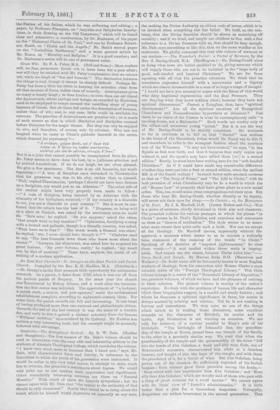Greek Wit. By F. A. Paley, M.A. (Bell and Sons.)—Most
readers will, we fear, pronounce Greek wit to have been but a poor affair ; nor will they be satisfied with Mr. Paley's explanation that we admire wit, while we laugh at "fun and humour." Tho died/lotion between the things is real, though it cannot be sharply defined. Perhaps Mr. Paley has been a little too strict in keeping his selection clear from all that savours of farce, rather than of comedy. Aristophanes gives us many a hearty laugh ; so does Lucian ; so oven does our old friend the *oaaerroids, whose sayings and doings, as recorded by Hieroeles, used to be employed to tempt onward the unwilling steps of young learners of Greek. But all these fall under the description of humour, rather than of wit; and, in any case, little could be available for extracts. The parodies of Aristophanes are genuine wit ; so is much of such scenes as that in which lEschylus and Euripides contend before Dionysus for the tragic throne. But they can only be enjoyed in situ, and therefore, of course, only by scholars. Who has not laughed when he came to Cleon's pathetic farovvoll to the crown which denoted his supremacy ?- "cs aricpave, xafpow 6,r101, .cal a' &nom Wu Aeirca. CIE 8' ess.aos TtS XatEllY ItEgrbdETRI, nAinTris min hi, pitAltur,, ein-ux4is But it is a joke that cannot possibly be transplanted from its place, Mr. Paley seems to have done his best, by a judicious selection and by pointed translations. If we do not laugh, we are often pleased. We give a few specimens. The first is an old favourite, but worth repeating :—" A man of Seriphus once remarked to Themistoeles that his greatness was duo to his city, rather than to himself, Well,' replied Themistoeles, perhaps I should not have been famous as a Seriphiam nor would you as an Athenian.'" The other side of the matter might have very properly been made to follow : —"A man of Seriphus, being taunted by an Athenian with the obscurity of his birthplace, retorted,—' If my country is a discredit to me, you are a discredit to your country.'" But it must be con- fessed that the attack has the best of it. " Diogenes, on being sold as a slave at Corinth, was asked by the auctioneer what ho could do. Rule men,' he replied. Do you suppose,' asked the other; that people want to buy masters I" " "Iphierates, fortifying a camp with a mound and -palisade, though in a friendly country, was asked, What have we to fear?' ' The worst words a General can utter,' be replied, are, I never shozad have thought it P " " Chnbrins used to ray, The best Generals were those who knew most about the enemy." "Lampus, the shipowner, was asked how he acquired his great fortune. 'My great fortune, easily,' ho replied ; 'my small one, by dint of exertion.'" These have, anyhow, the merit of ad- mitting of a modern application.


































 Previous page
Previous page